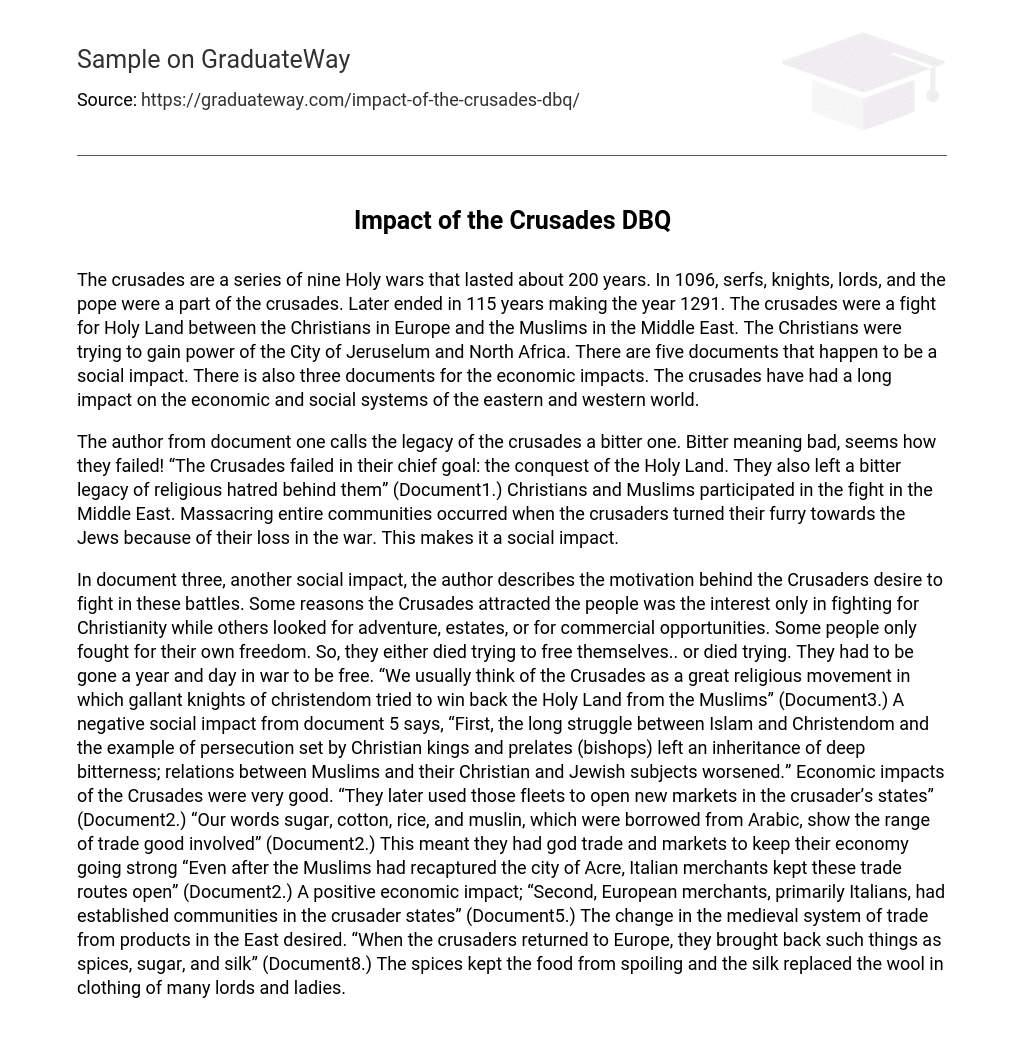The crusades are a series of nine Holy wars that lasted about 200 years. In 1096, serfs, knights, lords, and the pope were a part of the crusades. Later ended in 115 years making the year 1291. The crusades were a fight for Holy Land between the Christians in Europe and the Muslims in the Middle East. The Christians were trying to gain power of the City of Jeruselum and North Africa. There are five documents that happen to be a social impact. There is also three documents for the economic impacts. The crusades have had a long impact on the economic and social systems of the eastern and western world.
The author from document one calls the legacy of the crusades a bitter one. Bitter meaning bad, seems how they failed! “The Crusades failed in their chief goal: the conquest of the Holy Land. They also left a bitter legacy of religious hatred behind them” (Document1.) Christians and Muslims participated in the fight in the Middle East. Massacring entire communities occurred when the crusaders turned their furry towards the Jews because of their loss in the war. This makes it a social impact.
In document three, another social impact, the author describes the motivation behind the Crusaders desire to fight in these battles. Some reasons the Crusades attracted the people was the interest only in fighting for Christianity while others looked for adventure, estates, or for commercial opportunities. Some people only fought for their own freedom. So, they either died trying to free themselves.. or died trying. They had to be gone a year and day in war to be free. “We usually think of the Crusades as a great religious movement in which gallant knights of christendom tried to win back the Holy Land from the Muslims” (Document3.) A negative social impact from document 5 says, “First, the long struggle between Islam and Christendom and the example of persecution set by Christian kings and prelates (bishops) left an inheritance of deep bitterness; relations between Muslims and their Christian and Jewish subjects worsened.” Economic impacts of the Crusades were very good. “They later used those fleets to open new markets in the crusader’s states” (Document2.) “Our words sugar, cotton, rice, and muslin, which were borrowed from Arabic, show the range of trade good involved” (Document2.) This meant they had god trade and markets to keep their economy going strong “Even after the Muslims had recaptured the city of Acre, Italian merchants kept these trade routes open” (Document2.) A positive economic impact; “Second, European merchants, primarily Italians, had established communities in the crusader states” (Document5.) The change in the medieval system of trade from products in the East desired. “When the crusaders returned to Europe, they brought back such things as spices, sugar, and silk” (Document8.) The spices kept the food from spoiling and the silk replaced the wool in clothing of many lords and ladies.
The Crusaders next or new life: for serfs, they fought for adventure, freedom, and moral. The moral is if you died in the crusades, you went to heaven. They could gain wealth and power by being religious and fighting in the war. IF you conquered anything as a serf, you could have it by stealing it; legally. Knights and lords were a part of the Feudal agreement which meant they had to go but were promised power, wealth, and land. If they died in war, they were also promised to go to Heaven. The pope told thousands it’s okay to fight and to kill people.
Their religion was to heal the divide in the church and for knights to stop fighting each other. They wanted to free Holy land of the Turks and like the other Crusaders, gain wealth, power, and land. The crusades have had a long impact on the economic and social systems of the eastern and western world.





